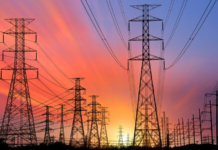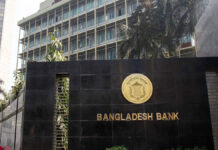
Inflation increased to 5.8% from 5.4%
Bangladesh posted a GDP growth rate of 7.9% in FY18, and is expected to achieve 7.5% GDP growth in FY19, according to a report by the Asian Development Bank (ADB).
ADB announced the projection, releasing an update to its Outlook-2018 report at the Bangladesh Resident Mission conference room in Dhaka yesterday, reports UNB.
The GDP growth rate achieved in FY18 is the highest for Bangladesh since 1974, the report said.
The 7.9% GDP growth is also slightly higher than the government’s estimate for FY18, which was 7.86%. The estimate was presented before a meeting of the Executive Committee of the National Economic Council (Ecnec) on September 18.
According to the ADB report, acceleration in private consumption, continued growth in public infrastructure investment and private investment, expansion in agriculture, industry, and microeconomic management, were drivers of the GDP growth.
However, the report also said the service sector underperformed in FY18, with slower growth in transport, as well as in financial, education, and health services. Furthermore, the country’s supply of money decreased from 10.9% to 9.2%.
Meanwhile, inflation increased to 5.8% from 5.4%.
The agriculture sector grew by 4.2% in FY18, while the industrial sector grew by 12.1%.
About the FY18-19 budget targets, the ADB said revenue is projected to grow by 30.8% and spending by 25.1%, with current spending 29.8% higher, mostly to pay out higher interest, subsidies, incentives, and current transfers.
Total expenditures in the fiscal year are slated to equal 18.3% of GDP, up from 16.5% a year earlier.
Regarding revenue collection, the ADB said a few major revenue-enhancing tax measures are proposed that would see increased revenue —due to better compliance because of automation, and the simplification, plus clarification, of the tax code and regulations.
“Attaining the revenue target will be a challenge, however, without implementing the new value-added tax. As in the past, expenditure control will compensate for any revenue shortfall to meet the targeted deficit,” reads the report.
The government’s subsidy bill in FY18-19 is expected to increase to $3.9 billion, or 1.3% of GDP. It is increasing from $2.7 billion, or 1.0% of GDP in FY17-18, mainly to allocate more funds to electric power and agriculture.
Export growth is projected to fall to 6.0% in FY18-19 from 6.4% in the previous year—as growth moderates in major industrial countries. This is common in the important European and US markets for garment exports as global uncertainty and trade tensions mount, it reads.
In its projection for FY19, the report said strong consumption, industry growth, and public investment, as well as stable export performance and remittance will help drive GDP growth. On the other hand, inflation is likely to increase due to higher global oil, gas, and electricity prices, and currency depreciation.
In response to a reporter’s query, ADB Bangladesh Country Director, Manmohan Prakash said: “Bangladesh’s economy has a very strong foundation, and is getting very close to crossing 8% GDP growth.”
Effective management of microeconomic policies, investment, human capital, and technology needs to be continued in order to cross the 8% GDP growth threshold, he added.
If private investment increases and grows faster in comparison to public investment, then the country’s economy will grow faster, Prakash said.
Regarding the effect of the upcoming national election on the Bangladesh’s economy, the ADB country director said: “We feel that the election will probably have a minimal impact on the economy for many reasons, such as the presence of stable economic policies, a good business environment, and people’s excitement over the polls.”
At the program, ADB also presented the current state of implementation of a $100 million grant for an emergency assistance project for Cox’s Bazar’s Rohingya community.
Prakash said the grant was being used for infrastructure development in Ukhia and Teknaf.
He added that if the grant was used effectively, then the donors would be asked for another $100 million grant for the displaced Rohingya community.
Meanwhile, ADB’s Senior Economist in Dhaka, Soon Chan Hong, said the trade war between the US and China was not likely to have a major impact on Bangladesh, but it may have a general impact on the world economy.
The ADB leaders assured that the bank would continue to provide uninterrupted assistance to further economic development in Bangladesh.
Source: Dhaka Tribune.









